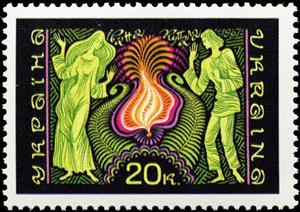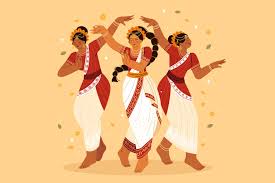Stamp: Ivan Kupala Holiday (Ukraine 1997)
Ivan Kupala Holiday (Ukraine 1997)
05 July (Ukraine ) within release Holidays goes into circulation Stamp Ivan Kupala Holiday face value 20 Ukrainian kopiyka
| Stamp Ivan Kupala Holiday in catalogues | |
|---|---|
| Colnect codes: | Col: UA 1997.07.05-01b |
Stamp is horizontal format.
Luminescent features: the yellow of the fire's flames. Ukrposhta note and illustrates but does not separately list two varieties of this issues: one with a greyish background and another with a blackish background [this variation].Also in the issue Holidays:
- Stamp - Ivan Kupala Holiday face value 20;
- Stamp - Ivan Kupala Holiday face value 20;
Stamp Ivan Kupala Holiday it reflects the thematic directions:
A festival is an event celebrated by a community and centering on some characteristic aspect or aspects of that community and its religion or cultures. It is often marked as a local or national holiday, mela, or eid. A festival constitutes typical cases of glocalization, as well as the high culture-low culture interrelationship. Next to religion and folklore, a significant origin is agricultural. Food is such a vital resource that many festivals are associated with harvest time. Religious commemoration and thanksgiving for good harvests are blended in events that take place in autumn, such as Halloween in the northern hemisphere and Easter in the southern.
A flame (from Latin flamma) is the visible, gaseous part of a fire. It is caused by a highly exothermic chemical reaction made in a thin zone. When flames are hot enough to have ionized gaseous components of sufficient density, they are then considered plasma.
A man is an adult male human. Prior to adulthood, a male human is referred to as a boy (a male child or adolescent).
A tradition is a system of beliefs or behaviors (folk custom) passed down within a group of people or society with symbolic meaning or special significance with origins in the past. A component of cultural expressions and folklore, common examples include holidays or impractical but socially meaningful clothes (like lawyers' wigs or military officers' spurs), but the idea has also been applied to social norms and behaviors such as greetings, etc. Traditions can persist and evolve for thousands of years— the word tradition itself derives from the Latin word tradere literally meaning to transmit, to hand over, to give for safekeeping. While it is reportedly assumed that traditions have an ancient history, many traditions have been invented on purpose, whether it be political or cultural, over short periods of time. Various academic disciplines also use the word in a variety of ways.
A woman is an adult female human. Before adulthood, a woman is referred to as a girl (a female child or adolescent)




